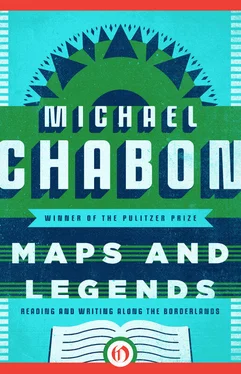There were exceptions, writers whose work drew overtly on sources in genre fiction and yet was taken seriously by critics, scholars, and general readers. They had names like Pynchon, Burroughs, Vonnegut, Nabokov, and their writing was often described as “transgressive,” as if choosing a detective hero or an interplanetary setting were not merely ill-advised if you hoped to make literature but violated an outright taboo. A detective novelist or a horror writer who made claims to artistry sat in the same chair at the table of literature as did a transvestite cousin at a family Thanksgiving. He was something to be allowed for, indulged, pardoned, excused, his fabulous hat studiously ignored.
I was twenty (let’s say). I accepted this curious ethos as indisputable, and found a strong appeal in the idea of transgression. I wrote a raft of stories that cross-dressed in the clothes of genre and found sure enough that when I gave them out to workshops, workshops tended to look away from the ostrich feather in my hat. “I don’t know anything about mysteries,” said the reader of one of my short stories, a surrealist effort featuring a gumshoe working a puzzling murder in a De Chirico city, written under the heavy influence of Chandler and Donald Barthelme. “I hate science fiction,” went another frequently offered bit of helpful criticism, “so there’s nothing I can really do to help you with this.”
When I first visited the campus of UC Irvine, where I eventually enrolled in the MFA writing program, I was ushered, with the kind of clueless goodwill that might impel you to introduce the only two Mennonites at your wedding to each other, into the company of Gregory Benford, a fine writer of extremely “hard” science fiction (Timescape, Across the Sea of Suns) and a professor in the UCI Department of Physics and Astronomy. I don’t remember now if Professor Benford had read any of my undergraduate work, or was only going on my description of it, but I do remember his polite and kindly bafflement.
A lonely business, transgressing. There was nothing that anybody could do for me. I laid aside the epic novel I had been planning, about a Holmesian detective investigating, on Earth and along the canals of the planet Mars, the disappearance of the great and greatly mistaken astronomer Percival Lowell, and turned instead to concentrate on this other book, a straightforward realistic narrative, equally influenced by Proust, Fitzgerald, and Philip Roth, about summertime and sexual identity in the city of Pittsburgh.
It was in this period, when I abandoned the career that was both to have culminated in and been launched by that novel about Mars, that I also turned my back on Judaism. I was learning to question everything; I guess I was trying to fit in. Nothing about my being Jewish — about my ancestors, about their languages and histories, about the stale holiday invocations of freedom, continuity, and survival — seemed to have use or relation to the ongoing business of my life at the time. Israel had lost its heroic claim on my imagination and seemed to have become, by means I did not understand, the ally and stooge of a Disneyfied president I loathed. In the meantime my mother moved away from the town where I grew up. I married a woman who was not Jewish, and began work on what was to be my second novel. I had no home, and neither, it seemed to me, did anyone — remember that I was living, at the time, in Southern California.
For a while, still young and interested in my own pain as an object of the world’s attention, I grooved along on my lostness. But after a while I got tired of feeling that way. That first marriage broke up, and the novel that was to be my second was even more doomed than the marriage. I wanted to know where I came from, to retrace my steps and see if I dropped anything along the way that might serve me, now, better than I had imagined at the time of letting it go.
I started to light candles; I met and married my present wife, the grandchild of European Jewish immigrants; I abandoned the novel and began the long wandering back to a place where I could feel at home.
I kept thinking about those Jews up there in Alaska, making their Yiddish land. And I kept thinking about genre and about the books I had always thought I was going to write. And little by little at first, and then all at once, the idea began to assemble itself: I would build myself a home in my imagination as my wife and I were making a home in the world. That idea led to the writing of my novel The Yiddish Policemen’s Union, set, with a kind of rapturous apprehension, in a place where the Weinreichs’ phrase book would come in very handy indeed.
It was as I made the laborious and thrilling move from reverie to fiction that I found myself driven by the second key element, to which I alluded earlier, of being a nice Jewish boy. Because if you are a nice Jewish boy, as Ray Philip Roth has conclusively proven, you are also, on some level, a mazik: there’s a devil in you, driving you to say, and to do, and to write things that you know you must or ought not say, do, or write. Like my uncle Stan with his mischievous email, the nice Jewish boy lives in thrall, at least some of the time, to the spirit of doing things af tselokhis, out of spite, a kind of magical, Trickster spite that, like Coyote or Loki of the Northmen, is responsible for all-destruction and all creation too.
If I could outrage a few people with one little essay — how many could I piss off with an entire novel?
GOLEMS I HAVE KNOWN, OR, WHY MY ELDER SON’S MIDDLE NAME IS NAPOLEON
A Trickster’s Memoir
I SAW MY FIRST golem in 1968, in Flushing, New York, shortly before my fifth birthday. It lay on a workbench in the basement of my uncle Jack’s house, a few blocks away from the duplex — we called it a “two-family house”—that my parents and I shared with a Greek couple, who lived upstairs. My uncle Jack owned a candy store in Harlem, in a neighborhood where there had once been only Jews but now there were only black people, though my uncle Jack did not call them that. He called them “the coloreds.” Nevertheless he always hired local Harlem people to work in his store, and he extended credit to many families in the neighborhood. I suppose he had complicated feelings about his customers, and they about him, both as a creditor and as a cranky and ill-humored man. Owning a candy store was not my uncle Jack’s choice of employment; he had failed at several other trades before finally arriving, with the last of his and my aunt’s savings, at the threshold of Mount Morris Candy and News. Though I was not told and did not understand any of this until much later, Uncle Jack was also a devoted Jewish scholar who nightly studied Torah and Talmud, and who had in the past year or so embarked upon the study of kabbalah, that body of Jewish mystical teachings that have produced the Zohar, the false messiah Sabbatai Zevi, and a sense of deep understanding and inner peace, or so one presumes, for Madonna and Roseanne Barr. My parents and my uncle and aunt were not especially close, but we lived so near to them that inevitably we ended up spending time at their house, and I soon learned to fear and to long to see whatever was going on down there in Uncle Jack’s basement, to which he invariably repaired as soon as decency and the serving of the babka allowed.
This all happened so long ago, and I was, it will be recalled, so young at the time that it’s hard for me to remember just how I contrived to convey myself down there under the house, into the basement, which I had been told in no uncertain terms was filled with all kinds of deliciously dangerous power tools and chemicals, and hence strictly off-limits, to have a look. If I were writing a short story, I would figure out how to get the parents out of the way, start them arguing bitterly about Vietnam or civil rights at the dinner table, and then have my fictionalized self slip away unnoticed, perhaps with a vague murmur about going to look at the money plants in the backyard, to head down the long dark stairway into the basement, with its smell of iron filings and cold linoleum. Since this is a memoir, though, I will be truthful and say I don’t know how I managed the trick. But I remember the dark stairs, and the cold iron smell.
Читать дальше
Конец ознакомительного отрывка
Купить книгу












